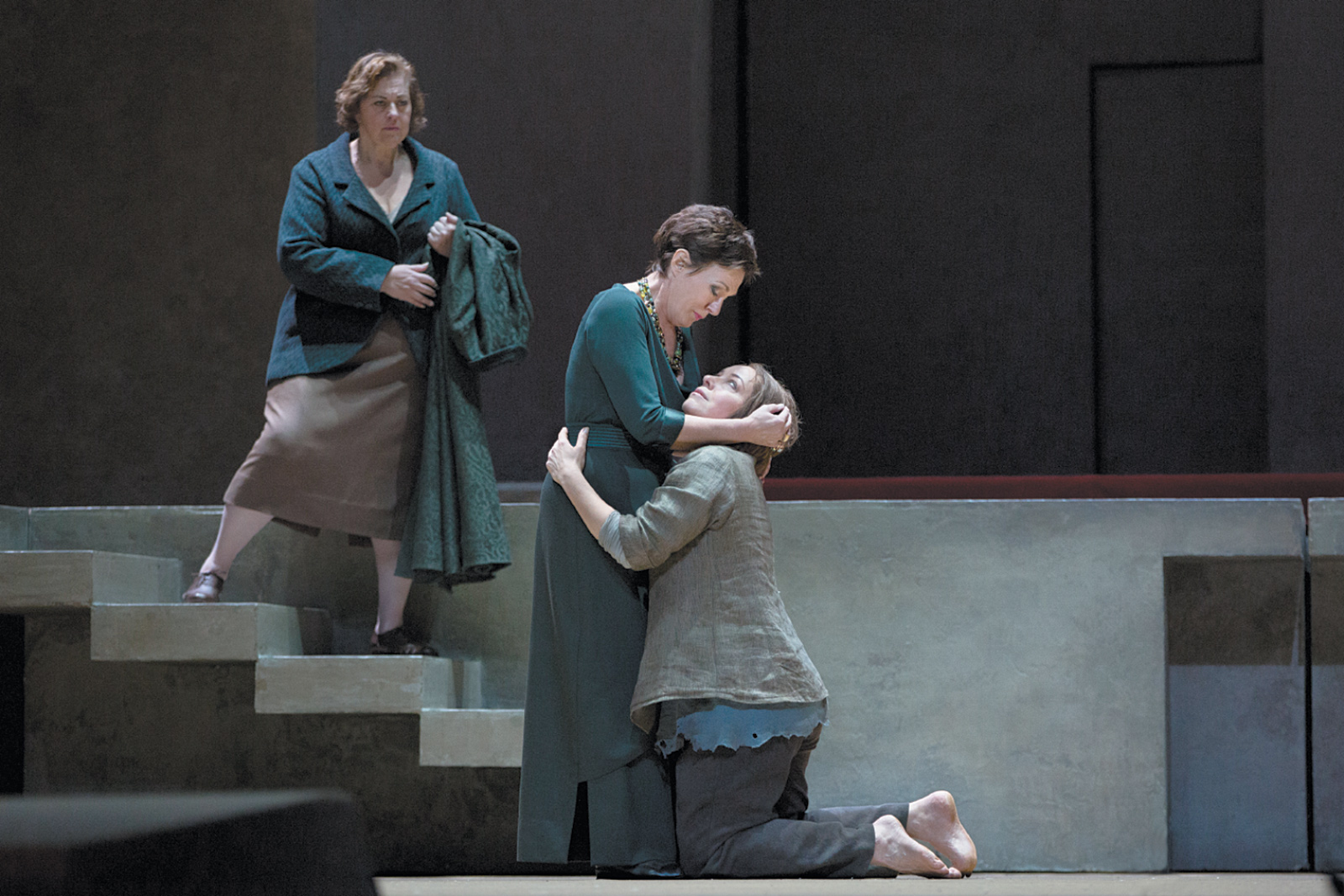There is no music as the curtain goes up on the Met’s new production of Richard Strauss’s Elektra—the last testament of director Patrice Chéreau, who died in October 2013, not long after this production’s premiere in Aix-en-Provence. The silence continues for what seems like a long time as we take in the set, which represents the courtyard of a generic ancient palace. It is a space without ornament, not even picturesquely ruined or weather-beaten. (The palace’s inner walls also provide a convenient surface for the projected subtitles. Given the compression and simplicity of Hugo von Hofmannsthal’s text—some lines are so pared down as to have the force of ideographs—the translated words become an integral part of the dramatic action.) Women move about engaged in sweeping and cleansing the enclosure, working with the indifferent efficiency of a routine blunted with repetition. Their costumes are thrift-shop drab, beat-up clothes for a beat-up world.
Here and throughout there are to be no metaphorical intrusions, no signposted historical or political cross-references. The clothes are modern but they seem perfectly at home in an archaic world entirely lacking any sense of myth or magic. We are simply dropped down in the midst of a situation, in a place where nothing has changed for a long time and where nothing is officially expected to change. Ancient trouble has been so fully absorbed that it has faded from conscious awareness, leaving only a residue of discontent and unease and a permeating hint of intimate disgust.
Much of this has been expressed before the sounding of the gouge-like triadic theme that inaugurates the opera and that will soon be linked to the name of the slaughtered king Agamemnon. The first notes set in motion a calibrated mechanism that proceeds without interruption or interlude under the most unrelieved pressure. The opera’s course could be described as sustained turbulence with intermittent bursts of emotional violence that subside only to emerge more forcefully. There is not even so much repose as a flight of fancy or a happy memory. Every human contact is pitched on the edge of explosion, as Elektra (Nina Stemme) confronts her sister Chrysothemis (Adrianne Pieczonka) and her mother Clytemnestra (Waltraud Meier), each such encounter excavating a deeper wound. The extreme becomes only more extreme. What is most obviously striking about Chéreau’s production—as directed at the Met by his longtime collaborator Vincent Huguet—is its deliberate underplaying, its toning down of any tendency to exaggerate what is already exaggerated or to evoke yet again the historical echoes of expressionist modernism.
Esa-Pekka Salonen, who conducts the production as he did the premiere in 2013, remarks that Chéreau “felt that the people are really people. They’re not caricatures. They’re not monstrous.” It is certainly quite a trick to achieve an impression of muted tones in an opera whose vocal tones are so far from muted. Strauss’s is not a quiet storm, even if it is a contained one, agitating within the walls, mental and physical, that hem it in. The opera enacts a controlled chaos. Chéreau’s direction makes strategic use of slowness and immobility and simplicity of gesture to isolate crucial reversals and eruptions, while the deployment of servants and messengers maintains a convincing sense of a household going about its business in the midst of unfolding catastrophe—if they are not in fact prisoners or mental patients making their rounds in a walled exercise yard.
The spareness of the design scrapes away whatever might get in the way of the details that matter, the split-second shifts of feeling and meaning, the unbearable tension of not ever connecting properly with other people, the condescension of the supposedly sane toward the supposedly mad, the refusal or inability to let go of mental pain. Everything is out in the yard, starkly displayed. There are exits, at left (to the outside world), at right (to another part of the compound), and at the rear of the stage (the domed recess whose door leads into the unseen regal space that will become a killing ground). Within the courtyard there is seemingly nowhere to hide, yet the mise-en-scène has its tricks and mysteries, and principal characters (especially Elektra) manage at times to disappear into shadows, retreat unseen into corners, or get lost in the crowd of household help.
As the maids, in the opera’s astonishingly busy and abrupt opening measures, rapidly bat back and forth their complaints about Elektra’s deranged and contemptuous behavior, anticipating that at any moment she will start howling again for her dead father, she herself slips in almost unobserved, clutching a bedroll and scampering convulsively to a wall in the lower courtyard, crouching there like a homeless woman, as if tossed out like refuse: the unhealed font of unhealable suffering, disruptive by her mere presence. Nina Stemme makes her character felt before she sings a note. Her body language is the picture of long-term depression, a shuffling weariness electric with anxiety. Her face glints with an intelligence suspicious of everyone around her, even as she barely musters the impetus to lift herself from one spot to another, or to respond to other people with some recognizable emotional communication. Slumped as if unable or unwilling to make any effort at all, she sullenly radiates fierce will and fierce perception.
Advertisement
Discussing the character of Elektra, Chéreau spoke of “the black wing of depression at work, with its exhausting alternation of weariness, fear, panic, and exaltation.” (He also described her “refusal of life that means that, being a prisoner, everyone else is also, with her,” and indeed the compound of the House of Atreus evokes memories of the Siberian camp of Janáček’s From the House of the Dead, Chéreau’s only previous Met production, in 2009.) Stemme has triumphantly realized Chéreau’s stated conception. Her singing is of a piece with her every stance and gesture, enacting with great precision every slippery psychic turnabout. She gives us not unleashed madness but white-knuckled restraint in the face of intolerable inner pressure.
We get a vivid sense of how exhausting it is to be with Elektra, and how much more exhausting to be Elektra. Elektra’s apparently compliant sister Chrysothemis emerged in Pieczonka’s vibrant and beautifully sung interpretation as a fighter determined to protect herself against being swallowed up by their family’s tormented legacy, and equally resistant to the importunings of Elektra to assist her in avenging their father. Stemme’s Elektra, who can summon up reserves of seduction and manipulation, visibly enjoys her ability to fake it when she needs to, whether with Clytemnestra or Chrysothemis or the hapless Aegisthus; her sister at least is wise to the game.
Their murderous mother, for all her gnawing suspicions and evil impulses, is a good deal slower on the uptake, or too distracted to pay close enough attention. From a certain angle Clytemnestra—sung by Meier with a depth that suggests the many times she has played this role—might be any nervously preoccupied middle-class mother visiting her troubled daughter in the mental hospital, making awkward conversation, deluding herself that things are going surprisingly well while veering off into her own flight of impervious self-absorption.
Chéreau sought to uncover a less categorically villainous Clytemnestra, to suggest that despite the murder of Agamemnon—of which she never speaks, and seems almost to have succeeded in forgetting—she still harbors a reservoir of potential empathy: “Strauss tells us that these two women are not immured in hatred, that they are mother and daughter, that they need to talk to each other.” The confrontation of mother and daughter, Clytemnestra’s only appearance, is the opera’s crux, a remarkably dense and twisty episode whose center of gravity shifts so rapidly as to suggest whiplash. At its center is Clytemnestra’s account of her nightmare with its uncanny evocation of a splintering psyche, a passage in which Strauss seems to pry open the opera’s musical framework to allow a glimpse of a farther, bleaker interior perspective.
Meier, who along with Pieczonka is among the holdovers at the Met from Chéreau’s original production in Aix, was persuasive in navigating the queen’s shifting personas: rattled, off balance, lost in her own windings; opening herself with almost touching naiveté, accompanied by a few bars of warmly insinuating music, to the idea that Elektra is “speaking like a healer” and might actually mean her well; acknowledging her daughter’s superior intelligence (“In deinem Kopf ist alles stark,” “Everything is strong in your head”) and entertaining the fantasy that she might still reach out to Elektra; overcome by terror and quick to seize on any possible remedy; and at last, in frustration, quick to shut down any impulse toward cajolement and fall back on threats of torture and starvation.
All through the scene the two women orbit around each other in their separate spheres of misery, pieces torn from the same substance that could never possibly be fitted together again. After all the role-playing there is a relief in Elektra’s fearfully extended and bloody-minded aria that culminates in her vision of her mother’s long-desired death: “I stand there and see you die at last.” At moments like this Stemme’s vocal performance achieves an extraordinary concentration of ferocity.
Chéreau’s approach might suggest the reduction of myth to therapeutic dimensions, but here there is no cure. The vengeance that Elektra has spent the entire opera envisioning and anticipating, in which she attempts to enlist her sister and then undertakes to accomplish on her own, carefully unwrapping the ax that killed her father to use for the purpose, can only destroy her. The passage from desire to reality begins with the return of Orestes, impressively sung by Eric Owens, and the tortured scene in which Elektra cannot even recognize the brother she has longed for, as he stands before her with an immobile firmness in contrast to her devastating mood swings. (Chéreau: “Too much time has gone by.”) The mixture of bloodshed and melancholy in Strauss’s latter scenes is wrenching, an emotional flavor far removed from the Sophocles tragedy that was Hofmannsthal’s point of departure.
Advertisement
Under Salonen’s direction the Met orchestra provided a stunning revelation of the score’s richness. With its exceptionally large complement of musicians, Elektra is an opera not so much bathed in music as poked by it, shaken by it, oppressed by it with that “weight of the ocean” evoked by Elektra toward the end. Its momentary infusions of lyricism and playfulness—the suggestion of the household becoming orderly and buoyant again, for a few bars, as Clytemnestra learns of Orestes’s supposed death, or the wheedling waltz theme as Elektra lures Aegisthus toward his doom—give way to overwhelming displays of power. After the killing of Clytemnestra and Aegisthus, the thunderous unseen choral voices singing Orestes’s name while Chrysothemis adds her own swelling triumphal note raise the volume to a shattering level. In these climactic moments of orchestral intensity Salonen elicited from the Met orchestra something like the sound of the sky falling.
After that, only silence could adequately respond. “Be silent and dance,” Elektra sings, and to the accompaniment of a soured and off-kilter waltz she begins her attempt at a celebration of victory. Stemme performs it as if she had forgotten the use of her legs and was capable only of a grotesque semblance of a dance, distorted and thwarted, the gesture of someone no longer able to open up to anything. She collapses into what looks, in this production, like terminal catatonia, knocked out by “the burden of joy” she announces herself as carrying. If the performance began in silence, its conclusion was greeted by as loud and prompt an explosion of audience approval as I have heard at the Met, as if the tension accumulated during that hour and forty-five minutes had at last been violently liberated. Under Huguet’s direction, the production brought Elektra to life as something belonging to the present moment: breaking news from 1909.




